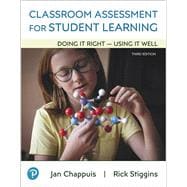Classroom Assessment for Student Learning helps readers gather accurate information about students' achievement and use the assessment process and its results effectively to improve achievement. This user-friendly guide is full of practical tips, activities, and real-world examples of what assessment for learning looks like in today's classrooms.
The 3rd Edition continues to focus on five keys to quality classroom assessment, with an enhanced emphasis on the formative use of classroom assessment results. The keys help readers 1) establish a clear assessment purpose to meet the information needs of all intended users; 2) base instruction and assessment on clear learning targets; 3) design or select all assessments to meet standards of accuracy; 4) communicate summative and formative results effectively; and 5) involve students in the assessment process and in using results to further learning.










